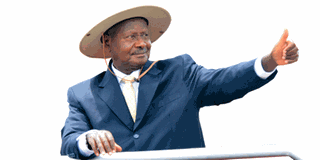If Museveni must tame monster he created, he must go all out

President Museveni
So, the Dear Leader wants to shrink the size of the bureaucracy and save the country’s meagre resources. All right. But where has this man been all this time?
President Yoweri Museveni works in lovely ways. Once upon a time we pointed out that UPE was killing our children. No attention was paid until ages later that some sort of committee of inquiry was formed. What happened to all that? Is UPE any better?
Once upon a time, we cried that forming new districts was a non-starter, a net burden on the public purse. The response was that the smaller the administrative unit, the closer it is to the people, the easier the service delivery. That was gobbledygook, obviously. Anyway, having ignored the people’s pleas, Mr Museveni eventually said no more new districts. The damage had been done, nonetheless.
Once upon a time, we said that Naads was byoya byanswa, that the signposts by the roadside were larger than the actual gardens they pointed to. After a long while, with so much public money down the hole, this and that was done and we ended up with Operation Wealth Creation (OWC).
With OWC, one is not sure whether it is intended to keep veterans occupied so that no one taps their gun skills and uses them in some bush to cause trouble for Mr Museveni, or that it is to transform agriculture.
Once upon a time, we wailed that the bureaucracy was too large, unwieldy, expensive, uninspired, generally corrupt, ill-supervised, and unproductive. We were ignored.
After more than three decades in power, the government as we have it today is a Yoweri Museveni creature through and through. It is created in his own good image. So, why deliberately create a monster and then turn around to wonder why the hell you have a monster?
It is good the bubble of patronage is bursting, possibly because the reality of a sluggish economy is biting deeper.
If Mr Museveni’s current term is truly a hakuna mchezo one, then he should go further and cut down the size of the entire government. He should also shrink the political bureaucracy, which is even more incompetent than the technocratic one. Uganda is one of the over-governed countries in the world with extremely little to show for it. We are not getting value for money from the taxes this government takes.
As many have argued, Mr Museveni should start by getting rid of RDCs. Even if they are a constitutional creation, amend them out of it (and trust me, this would be a lot easier than land and presidential age limit amendments). What on earth do RDCs do that cannot be done by the elected councillors in the hundreds of districts we have? These busybodies must go.
Of course, he should reduce the number of his advisers, number of MPs, and number of ministers. Half measures won’t do.
The reasoning that mini-cultural institutions cropping up every day are a democratic response to the need by communities for stronger identity is a naked exercise in political expediency. These, like many entities mentioned, are part of a vast patronage network that Mr Museveni uses to buy off elites at different levels of Ugandan society.
The on-going review of government agencies, with a view to eliminating some and merging others, is a belated appreciation that while patronage works for the leader; it does not work for the country. (On a curious note, the process of reorganising the government was already underway when Mr Museveni jumped in midway by ordering one. Bizarre.) Whereas the harm is already done, President Museveni can still use the lesson that the limits of patronage offers to do real salvage work.
Meanwhile, over down there in Angola, president Jose Eduardo dos Santos is leaving after 38 years in power. The country is in bad shape with massive inequality despite all the oil wealth, meaning that longevity in power and availability of lucrative natural resources does not always translate into clean and useful government. No matter, the man is leaving the key source of wealth in good hands.
Angola’s state-run oil company, Sonangol, is so rich and so powerful some regard it as a government within a government. Guess what, the old man is leaving his dear daughter Isabel dos Santos in charge of Sonangol.
Need I add that she also just happens to be such an astute businesswoman she is considered the richest woman in Africa, worth $3.5 billion (Shs12.6 trillion) according to Forbes. And, in this oil business, there is something called a sovereign wealth fund — basically a vehicle the government uses to invest some of its oil money for future use. Guess what, the old man’s son, Jose Filomeno de Sousa dos Santos, is the one in charge. We know where real power will lie, even after papa hands over state house. But at least he is leaving.
Mr Tabaire is the co-founder and director of programmes at African Centre for Media Excellence in Kampala. [email protected]
Twitter:@btabaire




